
– Fuel scarcity looms
– As residents move against tanker owners
Esther Oritse
Lagos — The leadership of the National Association of Road Transport Owners (NARTO) and Independent Petroleum Marketers Association of Nigeria (IPMAN) have ordered its members to instruct their representatives at the Dangote Refinery loading depots to suspend the programming of tankers for loading petroleum products, in protest against the enforcement of the E-call up system at the Lekki Port corridor by the Lagos State Government.
The implication of this development is that if the issue is not resolved within the next 24 to 48 hours, it could result in a nationwide scarcity of petroleum products.
In separate memos signed by NARTO President, Mr. Yusuf Lawal Othman and James Terlumun Tor National Secretary of IPMAN, the groups expressed strong opposition to the N12,500 fee imposed for the E-call up service, which is being implemented by the Lagos State Government in partnership with Call-Up Technologies Limited.
Othman disclosed that NARTO had proposed a payment of N2,500 per truck, instead of the N12,500 charge being demanded. He added that despite several engagements with relevant stakeholders, no consensus has been reached on the fee structure.
Part of NARTO’s Memo dated June 14, 2025 reads: This is to formerly address the recent directive issued by the Lagos State Government regarding the commencement of the N12,500 E-call up system for trucks operating along the Lekki-Epe corridor.
“Despite our continued effort and engagement, we have not reached a consensus with the relevant authorities on our proposed N2,500 per truck charge which we believe is more equitable and reflective of the current economic realities.
“In light of this unresolved issue, effective from June 16, 2025, all transporters are strongly advised to instruct their depot representatives to suspend the programming of trucks for movement along the Lekki-Epe Corridor until a mutually agreeable resolution is achieved.
“We appreciate your cooperation and urged all members to remain united and vigilant as we continue to engage the Lagos State Government in pursuit of a fair and sustainable outcome.”
Part of IPMAN’s reads: “The National Executive Committee (NEC) of Independent Petroleum Marketers Association of Nigeria (IPMAN) formally wish to address the recent directive issued by the Lagos State Government regarding the commencement of the ₦12,500 (Twelve Thousand Five Hundred Naira) E-Call Up System for trucks operating along the Lekki-Epe Corridor.”
Also speaking to Vanguard on development, NARTO’s President Yusuf Lawal Othman. said the N2,500 the group is proposing is not sacrosanct adding that they are willing to review their with the State Government.
Othman also said NARTO also want orderliness on the axis adding that the charge must be reasonable to be accommodated.
He disclosed that the suspension of operations is limited to the Lekki-Epe axis.
He said: “We support the E-call up, we support the orderliness but the amount being charged is what we do not agreed with. We are still trying to see if it can be negotiated. We are talking to them and following all necessary procedure to ensure that our members do not stop operations.
Meanwhile, the Lekki Estate Residents and Stakeholders Association, LERSA has backed the E-calll system saying that “It intended to prevent the return of chaotic traffic and infrastructure strain previously witnessed in the corridor, drawing lessons from the terrifying Apapa experience.”
In a statement signed by the Alhaji Sulyman Bello President of LERSA said that the initiative is long overdue adding that its success hinges on decisive and inclusive implementation.
Part of the statement reads: “The Lekki Estates Residents and Stakeholders Association (LERSA) has thrown its weight behind the Lagos State Government’s reintroduction of the electronic call-up (e-Call Up) system, set to become operational from Monday, June 16, 2025, along the Lekki-Epe corridor.
“The e-Call Up system, which regulates the movement of articulated trucks and tankers, is intended to prevent the return of chaotic traffic and infrastructure strain previously witnessed in the corridor, drawing lessons from the terrifying Apapa experience.
“As representatives of residents and stakeholders of the Lekki Peninsula, it has to be emphasized that our children, wards, spouses and neighbours as well as other stakeholders are the ones at the terrible receiving end of the current havoc that unregulated operation of trucks/tankers wreak. For the avoidance of doubt, we are strongly opposed to any manifest or clandestine attempts to undermine, sabotage or otherwise frustrate this noble initiative, which is designed to keep residents of the Lekki Peninsula safe. For the records, residents have had to contend with the increased trucking activities with corresponding upsurge in road accidents, pollution of the environment, unwarranted damage to public infrastructures and incessant traffic gridlock running into several hours with attendant loss of revenue and productivity. Having children in school buses spend three hours in the morning and four hours on the homeward journey has become a reality that perpetually saddens parents and other residents of the Lekki Peninsula.
“The health and safety of Lekki residents and commuters must never be compromised. This initiative is long overdue, but its success hinges on decisive and inclusive implementation. We commend the Lagos State Governor, Mr. Babajide Sanwo-Olu, and the Commissioner for Transport, Mr. Seun Osiyemi, for their leadership. We equally encourage our partners in the logistics and petroleum sectors to embrace dialogue over disruption.
“While reaffirming its support for the e-Call Up system, LERSA appeals to all parties to allow its implementation to proceed as scheduled on June 16, even as dialogue on any grey areas continues. Without any shred of doubt, the implementation of the e-Call Up system is an emergency antidote, which cannot be subjected to any more delay.
“The association pledges its continued commitment to engaging all stakeholders to ensure a safe, efficient, and economically viable transportation ecosystem within the Lekki-Epe axis.”
This article was originally posted at sweetcrudereports.com
Be the first to comment